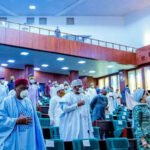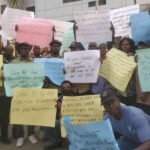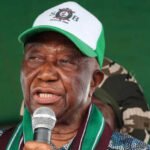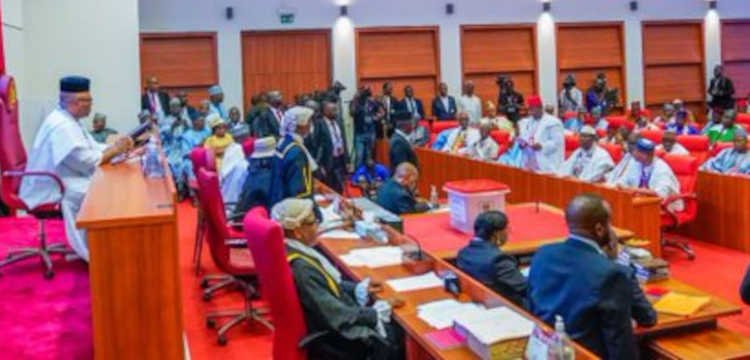While the average Nigerian grapples with soaring inflation and the daily quest for survival, our legislators have found the time and energy to engage in a spirited debate over the immortalisation of the late Professor Humphrey Nwosu, the man at the helm of the annulled 1993 presidential election.
Development Diaries reports that the Senate on Thursday threw out prayers contained in a motion seeking to rename the Independent National Electoral Commission (INEC) headquarters after the former chairman of the defunct National Electoral Commission (NEC).
Yes, that was what happened: a hallowed chamber with distinguished senators, voices raised, passions inflamed, all over the proposal to rename the INEC headquarters after Professor Nwosu.
Senator Enyinnaya Abaribe championed this cause, seeking posthumous national honours for Nwosu’s role in Nigeria’s democratic journey; and the debate was anything but unanimous.
Senators Osita Ngwu and Austin Akobundu praised Nwosu’s contributions, highlighting the constraints he faced under military rule. Conversely, Senators Jimoh Ibrahim and Cyril Fasuyi questioned the merit of honouring someone who, under duress or not, failed to announce election results.
The climax? The motion was rejected through a voice vote, leaving its supporters with faces contorted like someone tasting an unripe lime.
The reality of the Nigerian masses
While our senators engage in these lofty deliberations, the common Nigerian faces a starkly different reality, with unemployment and underemployment numbers soaring.
Inflation has been relentless, climbing from 18.8 percent in 2022 to 24.5 percent in 2023, driven by escalating fuel costs and a depreciating naira.
Petrol prices alone surged by 167 percent. These figures translate to real-life struggles, as many families are unable to afford basic necessities, youths are disillusioned by bleak employment prospects, and the populace is growing increasingly weary of unfulfilled promises.
Priorities should align with people’s needs
In light of these pressing challenges, the Senate’s preoccupation with immortalising a historical figure appears, at best, a misplacement of priorities. While acknowledging and honouring contributors to our democratic evolution is important, it pales in comparison to the immediate need for policies and actions that address the economic hardships besieging Nigerians.
The legislative arm of government holds the power to enact laws and oversee policies that can stimulate economic growth, create employment opportunities, and alleviate poverty.
Debates that do not directly contribute to these objectives risk being perceived as disconnected from the realities of the citizenry.
As the curtains fall on this latest act in our national political drama, one cannot help but wonder: when will our leaders’ scripts align with the urgent needs of the people?
The time spent debating the renaming of a building could be more productively utilised in formulating and implementing strategies that tackle inflation, boost employment, and lift millions out of poverty.
Development Diaries calls on Nigerian lawmakers, both at the federal and state levels, to prioritise the immediate needs of people in their deliberations, as the Nigerian populace deserves a government attuned to their struggles, responsive to their needs, and committed to actions that translate into tangible improvements in their daily lives.
In the end, while the legacy of Professor Nwosu and others like him should be acknowledged, perhaps the greatest honour we can bestow upon our democratic pioneers is to build a nation that truly embodies the principles they stood for: a nation where governance translates into genuine development and prosperity for all.







